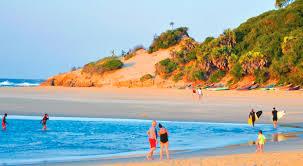Tourism is the set of activities involving the movement of people from one place to another, be it domestic or international. Characterized by a bush-beach offer, Mozambique offers visitors different types of tourism, highlighting the sun and beach tourism, eco-tourism, cultural and artistic, gastronomic, the scientific, the nature, rural and urban, recreational, the business of adventure with special focus on diving in coral areas, health, among others that fill the large literature on types of tourism.
So in this work we are going to talk about Tourism in Mozambique, where we will talk about characteristics, importance and more.
Tourism
Tourism is the set of activities involving the movement of people from one place to another, be it domestic or international.
Tourism is connected to multiple segments, including, tourism consumption, which are organized excursions with the main purpose of shopping, religious tourism, carried out for meetings in regions with religious tradition, cultural tourism, rural tourism, eco-tourism etc.
Tourists are considered people who leave their country or region for a business trip to another country or region for a period not exceeding twelve months without the main intention is to develop a paid activity.
Tourism has great importance in the world economy since the arrival of tourists increases consumption, the production of goods and services and especially the need to create new jobs. The World Tourism Day is celebrated on 27 September.
Tourism in Mozambique
Mozambique has in tourism a great potential for the growth of its gross domestic product (GDP), despite its current contribution lie only in 5.6%.
The beaches with clean water are suitable for tourism practice, especially those who are far away from urban centers, such as the province of Cabo Delgado, especially the Quirimbas islands, and Inhambane province, especially the Archipelago Bazaruto.
The country also has several national parks, especially the Gorongosa National Park, with its rehabilitated and repopulated in certain species of animals that were already fading infrastructure.
Tourism is a socio-economic activity that has been experiencing a sharp growth in the world that can match the automotive and petróleo.A industry has been providing a number of countries sustainable development, allowing them to increase their economic gains, provide their culture and contribute to the environmental protection of natural and cultural resources.
Mozambique for its location, on the south eastern coast of Africa, presents an enormous potential for the practice of tourism and also for the development of new tourism development projects. The geographical location, climate, natural resources, history, culture and hospitality make this country one of the most potential features for the development of the tourism sector in the Southern African region.
Characterized by a bush-beach offer, Mozambique offers visitors different types of tourism, highlighting the sun and beach tourism, eco-tourism, cultural and artistic, gastronomic, the scientific, the nature, rural and urban, recreational, the business of adventure with special focus on diving in coral areas, health, among others that fill the large literature on types of tourism. In its eleven provinces various attractions are to make this country a real pearl in the Indian Ocean.
From north to south, from west to east are pristine beaches; underwater riches composed of varied species of animals; corals; rich archaeological finds witnessing cultural intersections, typical biodiversity of southern Africa, forests and wildlife of the tropics; waterfalls, rivers and streams and lakes and ponds.
Its rich and unexplored tourism potential; the political and military stability, marked improvement of basic infrastructure in most provinces, the incentive to promote this sector by facilities in tourism and national investment policy and support programs such as Made in Mozambique and the recent credit for tourism created by the National Tourism Fund, make this country a great spot for foreign investment and local, in order to increase the supply of tourist infrastructure to support tourism, with a strong focus for tourist transport and other tourist services, as travel agencies and travel that are confined at present, the country's capital, Maputo.
In 2010, a few kilometers from the Mozambican border will happen one of the biggest sporting events in the world, the World Cup in neighboring South Africa; this event by its dimensions requires a number of conditions in both the country of production of proof as those around him. Brazil and Portugal and recently Angola are countries that have already passed and often pass through this competition and may Mozambique as his "military camp" to prepare their training for this competition, because these countries have in common language, the gastronomic and cultural traits .
The role of Mozambique will be essential to create conditions for the provision of tourism infrastructure and tourist services adequadospara the masses who flock to watch the event. The need for luxury hotels with accommodation centers and sports training; quality of tourist transport, guides and entertainment services, and others still are opportunities for the most attentive investors achieve gains of their applications through the implementation of tourism projects.
In Mozambique, the adventure tourism in the mountainous areas and the rivers and waterfalls, health, hot, hot springs and agro-tourism are also areas without major records of exploration or investments; proving to be a viable market for new projects. Also there is every need for training entry-level cadres and higher to help tailor the numerous existing tourism and future demands of growing international demand, regional and local.
Conclusion
After investigating about the tourism in Mozambique, we concluded that it plays a decisive role concerning the development of certain regions where no other alternatives are found to achieve such aim.
The country has developed a segment of high performance density rate, which allows to develop luxury developments, but with little pressure volume of people moving there. It is of a product facing a very specific segment, that is those tourists who select very tightly the place where they want to go, want to have peace, they want to have tranquility, contact with nature and want to have a very intensive relationship with the communities and persons that are in place.

